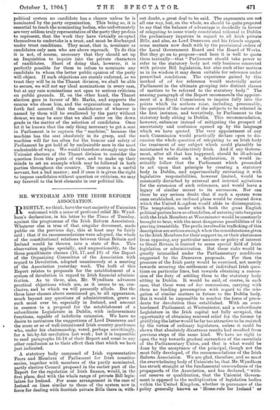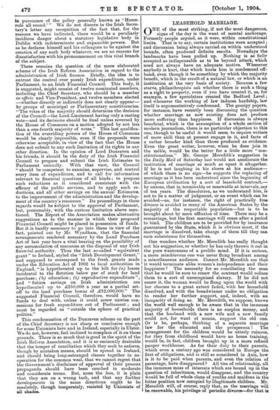MR. WYNDHAM AND THE IRISH REFORM ASSOCIATION. R IGHTLY, we think,
have the vast majority of Unionists welcomed with a sense of profound relief Mr. Wynd- ham's declaration, in his letter to the Times of Tuesday, against the programme of the Irish Reform Association. Whatever else is true of that singular document, made public on the previous day, this at least may be fairly said : that if its recommendations were adopted, the whole of the constitutional relations between Great Britain and Ireland would be thrown into a state of flux. This observation applies specially, and unquestionably, to the three penultimate clauses (16, 17, and 18) of the Report of the Organising Committee of the Association with regard to Devolution, adopted unanimously at a meeting of the Association yesterday week. The bulk of this Report relates to proposals for the establishment of a system of devolution in reward to Irish financial adminis- tration. As to these, also, Mr. Wyndham advances practical objections which are, as it seems to us, con- clusive, and to which we will presently allude. But the three later clauses above mentioned go, to all appearance, much beyond any questions of administration, grave as such must ever be, especially in Ireland, and amount in essence to a proposal for the establishment of a subordinate Legislature in Dublin, with indeterminate functions, capable of indefinite extension. We have no desire to caricature the suggestions of Lord Dunraven and • the score or so of well-intentioned Irish country gentlemen who, under his chairmanship, voted, perhaps unwittingly, for a bit-by-bit revolution last week ; but it is impossible to read paragraphs 16-18 of their Report and come to any other conclusion as to their effect than that which we have just indicated.
A statutory body composed of Irish representative Peers and Members of Parliament for Irish constitu- encies, together with members of the partly nominated, partly elective Council proposed in the earlier part of the Report for the regulation of Irish finance, would, in the first place, deal with the whole range of private Bill legis- lation for Ireland. For some arrangement in the case of Ireland on lines similar to those of the system now in force for dealing with Scottish private Bills there is, with- out doubt, a great deal to be said. The arguments are not all one way, but, on the whole, we should be quite prepared to say that the balance of advantage is decidedly in favour of relegating to some wisely constituted tribunal in Dublin the preliminary inquiries in regard to all Irish private Bills, and also, as Lord Dunraven and his friends suggest, some matters now dealt with by the provisional orders of the Local Government Board and the Board of Works. But they go on to propose—and here it is well to quote them textually—that "Parliament should take power to refer to the statutory body not only business connected with private Bill legislation, but also such other matters as in its wisdom it may deem suitable for reference under prescribed conditions. The experience gained by this method of ad hoc reference would materially assist Parliament in the ultimate grouping into distinct classes of matters to be referred to the statutory body." The ensuing paragraph of the Report recommends the appoint- ment of a Royal Commission to inquire fully into the points which its authors raise, including, presumably, the question of the nature of the subjects to be referred in the first instance, and tentatively, by Parliament to the statutory body sitting in Dublin. This recommendation, however, enhances instead of mitigating the prospect of uncertainty and confusion opened up by the language which we have quoted. The very appointment of any such Commission would practically declare open to dis- cussion the whole question of relegating to an Irish body the treatment of any subject which could plausibly be maintained to be distinctively Irish. And if any Govern- ment, after all that has happened, should be ill-advised enough to make such a declaration, it would in- evitably follow that the Parliament which proceeded to act upon that principle by creating a statutory body in Dublin, and experimentally entrusting it with legislative responsibilities, however limited, would be constantly disturbed by external and internal e for the extension of such references, and would leave a legacy of similar unrest to its successors. Nor can there be any serious doubt that if such a system were once established, an inclined plane would be created down which the United Kingdom would slide to disintegration. The temptation, under which both the great English political parties have so often fallen, of entering into bargains with the Irish Members at Westminster would be constantly brought to bear, with the most dangerous possibilities of its proving irresistible. The perils involved in trafficking of this description are serious enough when the considerations given to the Irish Members for their support to, or their abstinence from opposing, any particular measure or policy of interest to Great Britain is limited to some special field of Irish legislation or administration. But these risks would be greatly intensified under the Parliamentary conditions suggested by the Dunraven proposals. For then the pressure of the Irish party would be exercised, not merely towards securing the settlement of individual Irish ques- tions on particular lines, but towards obtaining a conces- sion of the duty of settling them to the statutory body sitting in Dublin. It would be said, of course, in each case, that these were ad hoc concessions, carrying with them no binding presumption with regard to the rele- gation of similar matters in future to the Dublin body. But it would be impossible to combat the force of prece- dents for devolution thus established. With an over- burdened Parliament at Westminster, and a subordinate Legislature in the Irish capital not fully occupied, the opportunity of obtaining renewed relief for the former by gratifying the latter would be far too attractive to be resisted by the virtue of ordinary legislators, unless it could be shown that absolutely disastrous results had resulted from previous steps of the same kind. We have no right to open the way towards gradual surrenders of the essentials of the Parliamentary Union, and that is what would be done by the acceptance of the principal, though not the most fully developed, of the recommendations of the Irish Reform Association. We are glad, therefore, and so must the overwhelming body of Unionists be, that Mr. Wyndham has struck straight at the fundamental unsoundness of the propaganda of the Association, and has declared, "with- out reserve or qualification, that the Unionist Govern- ment is opposed to the multiplication of legislative bodies within the United Kingdom, whether in pursuance of the policy generally known as Home-rule for Ireland' or in pursuance of the policy generally known as Home- rule all round.'" We do not discern in the Irish Secre- tary's letter any recognition of the fact that, for the reasons we have indicated, there would be a peculiarly insidious danger about a statutory legislative body in Dublin with indeterminate and expansible powers. But as he declares himself and his colleagues to be against the creation of any such body whatever, we see no reasons for dissatisfaction with his pronouncement on this vital branch of the subject.
There remains the question of the more elaborated scheme of the Irish Reform Association in regard to the administration of Irish finance. Briefly, the idea is to entrust the control over purely Irish expenditure, under Parliament, to an Irish Financial Council. This body, it is suggested, might consist of twelve nominated members, including the Chief Secretary, who should be a member ex officio and Vice-President, and twelve members elected —whether directly or indirectly does not clearly appear— by groups of • municipal or Parliamentary constituencies. "The votes of the majority should determine the decision of the Council—the Lord-Lieutenant having only a casting vote—and its decisions should be final unless reversed by the House of Commons on a motion adopted by not less than a one-fourth majority of votes." This last qualifica- tion of the overriding powers of the House of Commons would be clearly impossible, even if the proposals were otherwise acceptable, in view of the fact that the House does not submit to any such limitation of its rights in any other direction. In the opinion of Lord Dunraven and his friends, it should be the duty of the Irish Financial Council to prepare and submit the Irish Estimates to Parliament annually. With that view, the Council "should be competent to examine, supervise, and control every item of expenditure, and to call for information relevant to financial questions of all kinds ; to propose such reductions as it considered consistent with the efficacy of the public services, and to apply such re- ductions, and all other savings on the annual Estimates, to the improvement of the administration and the develop- ment of the country's resources." Its proceedings in these regards would be subject to the approval of Parliament, but, presumably, with the curious limitation above men- tioned. The Report of the Association makes alternative suggestions as to the manner in which their proposed Financial Council might be placed in possession of funds. But it is hardly necessary to go into these in view of the fact, pointed out by Mr. Wyndham, that the financial arrangements rendered necessary by the Land Purchase Act of last year have a vital bearing on the possibility of any accumulation of resources at the disposal of any Irish financial authority. Thus the last so-called "equivalent grant" to Ireland, styled the "Irish Development Grant," and supposed to correspond to the fresh grants made under the Education Act of 1902 to local authorities in England, "is hypothecated up to the hilt for (a) losses incidental to the flotation below par of stock for land purchase ; (b) education ; (c) reproductive expenditure", and "future savings on Irish administration are hypothecated up to £250,000 a year as a partial set- off to the land purchase bonus of £12,000,000." The suggested Financial Council, therefore, would have no funds to deal with, unless it could screw unwise con- cessions for fresh expenditure out of Parliament ; and must be regarded as "outside the sphere of practical politics."
This condemnation of the Dunraven scheme on the part of the Chief Secretary is not sharp or conclusive enough for some Unionists here and in Ireland, especially in Ulster. We do not, however, feel inclined to complain of it on those grounds. There is so much that is good in the spirit of the Irish Reform Association, and it is so eminently desirable that the temper of conciliation which they seek to enforce, though by mistaken means, should be spread in Ireland, and should bring long-estranged classes together in co- operation for the common weal, that we cannot regret that the Government's disclaimer of approval of their present propaganda should have been couched in moderate and considerate terms. But, none the less, it is plain that they are on a wrong tack, and that any further developments in the same directions ought to be resolutely, though temperately, resisted by Unionists of all shades.























































 Previous page
Previous page